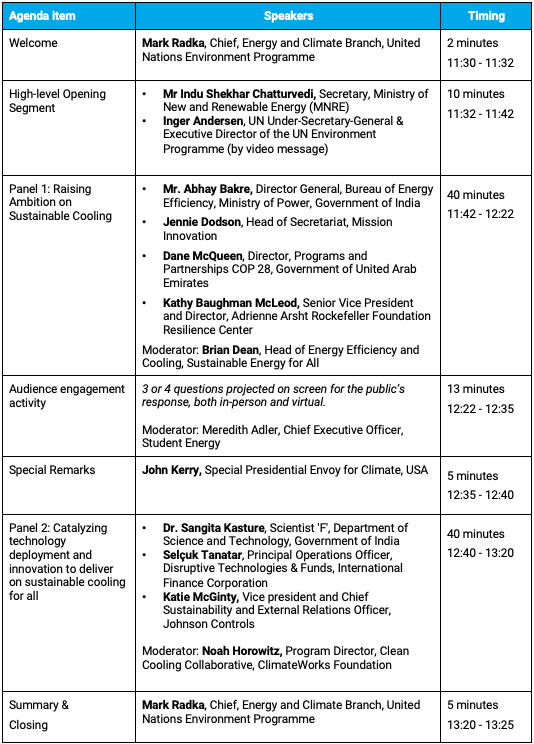Side event to the Global Clean Energy Action Forum
Date: Friday, 23 September 2022 Time: 11:30 AM – 13:45 PM EST (GMT-4)
Location: Room 301, David L. Lawrence Convention Center, Pittsburgh USA
Event Language: English Format: in-person event with live online broadcast
Organized by: Ministry of Power and Bureau of Energy Efficiency, Government of India; UN Environment Programme; MI Innovation Community Affordable Heating & Cooling of Buildings; Cool Coalition; Clean Cooling Collaborative
In partnership with: RMI, Lawrence Berkeley National Laboratory, United For Efficiency, Global Alliance for Buildings and Construction
Event Description
The latest IPCC reports are clear: climate change is already upon us, disrupting the lives of billions of people, including with prolonged extreme heat. At 1.5°C of warming, 2.3 billion people could be vulnerable to severe heat waves. Against this backdrop, it is urgent that we speed up the green energy transition while building climate resilient societies.
In a warming world, cooling is an essential part for economic growth and is required across different sectors of the economy, including residential and commercial buildings, cold-chain, refrigeration, transport and industries. But business-as-usual generates a vicious cycle: cooling contributes to climate change by increasing demand for electricity, much of which is still generated from fossil fuels, and through leakage of refrigerants, which have a much higher global warming potential than CO2 emission. If left unchecked, emissions from cooling are expected to double by 2030 and triple by 2100, driven by heat waves, population growth, urbanization, and a growing middle class.
Efficient, climate-friendly cooling provides huge opportunities to reduce energy consumption and emissions: meeting future cooling needs sustainably could cut 8 years of global emissions and reduce the costs of the renewable energy build out by $3.5tn by 2030. To get there, we need policies and regulations to foster efficiency in appliances and buildings, long-term comprehensive planning, financial mechanisms and global collaboration to enable mass deployment of best practices and innovative solutions. India is one of the first countries to develop a comprehensive Cooling Action Plan to set a long-term vision to address cooling demand across sectors and map actions that can help reduce the cooling demand.
If we get it right, sustainable cooling can advance the goals of the Paris Climate Agreement, the Sustainable Development Goals and the Montreal Protocol’s Kigali Amendment. This session will bring together government representatives, CEOs and global experts to showcase best practices to date, including the ambitious efforts ongoing in India, and to raise the profile of sustainable cooling, at CEM and beyond, as a key piece of the puzzle in the energy transition and achievement of sustainable development.
Objectives
- Highlight needed steps to deliver sustainable cooling for all across sectors, including urban development, space cooling and buildings, cold chain and cold storage.
- Discuss opportunities to design tailored funding plans to catalyze implementation of enabling policies and sustainable cooling technologies, which would aggregate member countries’ demand through a global tender/procurement process.
- Increase joint action on knowledge and technology transfer, technical assistance and innovation for cooling, towards COP28, to adapt to and mitigate climate risks.
Agenda

